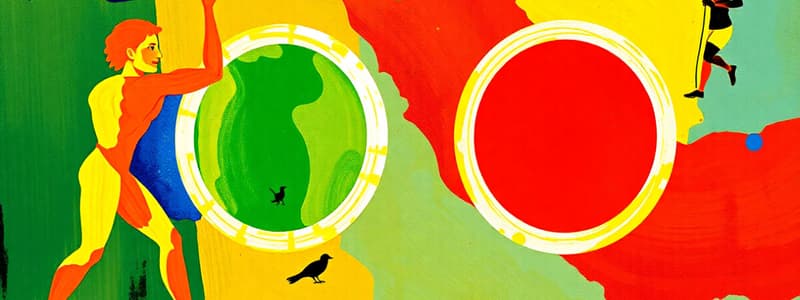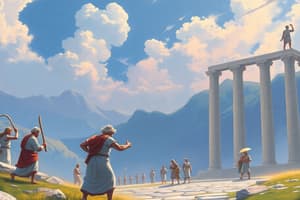Podcast
Questions and Answers
How did the ancient Olympic Games primarily differ from the modern Olympic Games in terms of athlete participation?
How did the ancient Olympic Games primarily differ from the modern Olympic Games in terms of athlete participation?
- Ancient Games focused on team sports, while modern Games emphasize individual competitions.
- Ancient Games only permitted male athletes of Greek origin, whereas modern Games include both male and female athletes from all nations. (correct)
- Ancient Games allowed professional athletes, while modern Games are strictly for amateurs.
- Ancient Games had no restrictions on the social status of athletes, unlike modern Games.
Which of the following best describes the role of the National Olympic Committee (NOC) in relation to the International Olympic Committee (IOC)?
Which of the following best describes the role of the National Olympic Committee (NOC) in relation to the International Olympic Committee (IOC)?
- The NOC governs the IOC and serves as the primary liaison between the IOC and individual countries, promoting Olympic ideals and facilitating participation. (correct)
- The NOC is a branch of the IOC, responsible for organizing the winter Olympic Games.
- The NOC is primarily responsible for enforcing anti-doping regulations at the international level, reporting directly to the IOC.
- The NOC operates independently of the IOC, focusing solely on national-level sports development.
In what way does Olympic Value Education seek to influence sports participation beyond just winning medals?
In what way does Olympic Value Education seek to influence sports participation beyond just winning medals?
- By fostering values like fair play, respect, and personal excellence, promoting a balanced approach to physical, mental, and emotional well-being. (correct)
- By ensuring that all participants receive equal financial compensation, regardless of performance.
- By mandating strict training regimens for young athletes.
- By focusing primarily on the historical significance of the Olympic Games.
What is the significance of the Olympic flame, and how does its journey from Greece to the host city embody Olympic ideals?
What is the significance of the Olympic flame, and how does its journey from Greece to the host city embody Olympic ideals?
How does the Olympic motto, Citius, Altius, Fortius – Communiter, reflect the core principles of the Olympic Games?
How does the Olympic motto, Citius, Altius, Fortius – Communiter, reflect the core principles of the Olympic Games?
What impact did Baron Pierre de Coubertin have on the Olympic Games?
What impact did Baron Pierre de Coubertin have on the Olympic Games?
Which option best explains how the International Sports Federation (ISF) supports the Olympic movement?
Which option best explains how the International Sports Federation (ISF) supports the Olympic movement?
What is the main function of the Indian Olympic Association (IOA)?
What is the main function of the Indian Olympic Association (IOA)?
Which of the following best illustrates the Olympic ideal of 'fair play'?
Which of the following best illustrates the Olympic ideal of 'fair play'?
What is the role of the Olympic mascot in promoting the Games?
What is the role of the Olympic mascot in promoting the Games?
Flashcards
Ancient Olympics
Ancient Olympics
Religious and sports competitions held every 4 years in Olympia, Greece, including events like racing, wrestling, and the javelin throw. Winners were awarded olive crowns.
Modern Olympics
Modern Olympics
An international sports event promoting global unity, value education, and international integrity, allowing both male and female participants and professional and amateur athletes.
Olympic Value Education
Olympic Value Education
The joy of effort, fair play, respect for others, pursuit of excellence, and balance in life, emphasizing the fundamental right to participate in sports without restriction.
Olympic Flag
Olympic Flag
Signup and view all the flashcards
Olympic Flame
Olympic Flame
Signup and view all the flashcards
Olympic Motto
Olympic Motto
Signup and view all the flashcards
International Olympic Committee (IOC)
International Olympic Committee (IOC)
Signup and view all the flashcards
National Olympic Committee (NOC)
National Olympic Committee (NOC)
Signup and view all the flashcards
International Sports Federation (ISF)
International Sports Federation (ISF)
Signup and view all the flashcards
Olympic Mascot
Olympic Mascot
Signup and view all the flashcards
Study Notes
Ancient Olympics
- Ancient Olympics commenced in 776 BC, initiated by Heracles to honor Zeus, his father.
- These Olympics were both a religious observance and a sports competition
- Events included javelin throw, wrestling, racing, and boxing.
- Winners received olive crowns.
- Games were held every 4 years in Olympia, Greece.
- Romans banned the Olympic Games, but the concept endured
- Participants were required to be Greek, physically fit, and neither slaves nor criminals.
- Competitors stayed for a month prior to participation.
- Women were barred from participation.
- Only amateur athletes were allowed to compete.
- Opening ceremonies involved gathering fathers, brothers, and trainers in the stadium.
- Experts in sports administered oaths to participants.
- Sacrifices of pigs were offered to Zeus.
- Spectators could object to a competitor, even after extensive training.
- The games lasted about five days.
- Winners were awarded with an olive crown, animals, or grains.
Modern Olympics
- The Modern Olympics emerged from a desire to promote global unity and brotherhood.
- Baron Pierre de Coubertin is known as the father of the Modern Olympics.
- In 1893, a meeting was held to encourage countries to participate.
- The aim was to cultivate value education, fraternity, social qualities, and national as well as international integrity.
- Initial participants included Italy, Greece, and Spain.
- The first Modern Olympic Games included nine countries.
- Women began participating in 1900.
- The Olympics were canceled in 1916, 1940, and 1944 due to World Wars.
- Both male and female participants are allowed in the Modern Olympics.
- Both professional and amateur athletes are eligible to participate.
- Participants require approval from their National Olympic Committee.
- A torch, symbolizing the Olympic flame, is brought from Greece.
- The head of state declares the Games open.
- A march pass includes all participating athletes.
- An Olympic oath is taken.
- Recreation and cultural programs occur.
- In closing ceremonies, athletes gather, and the head of state shares enjoyment.
- The Olympic Committee is honored.
- The Games are officially closed, the flag is lowered, and passed to the next host country.
- The Olympic flame is extinguished.
- Music and cultural performances take place.
- The Olympic song is sung.
Olympic Value Education
- It is based on the philosophy of the Olympics, emphasizing success through shared values.
- Key aspects include the joy of effort, fair play, respect, pursuit of excellence, and balance.
- It underlines the fundamental right to participate in physical education and sports without restriction.
- It encourages sports participation for enjoyment and refreshment of the mind.
- Sports days in schools promote recreation, reducing stress.
- Rules should be respected, team members honored, and mistakes acknowledged.
- Recognizing and appreciating good performance, even when competing, is important.
- Fair play is demonstrated by respecting rules and opponents.
- A fair play attitude is improved through sports participation.
- It promotes peace, equality, and unity among different races, religions, and socio-economic backgrounds.
- Equality is given to all, regardless of background.
- Respecting others, young or old, is fundamental.
- Striving for best performance happens when you achieve excellence.
- Give your best performance and improve outcomes.
- Excellence comes through effort, practice, and self-improvement.
- It encourages a healthy and balanced lifestyle.
- It balances physical, mental, and emotional well-being.
- Better focus of health and fitness is promoted to develop the athlete's body, mind, and character.
Olympic Symbols
- The Olympic flag was designed by Baron Pierre de Coubertin in 1913.
- It features five interlocking rings on a white silk cloth, representing continents and unity.
- The Olympic flame symbolizes spirit, knowledge, and life.
- It is lit in Greece and carried by runners to the host country.
- The flame burns throughout the Games and is extinguished at the closing ceremony.
- The Olympic mascot is a fictional character (animal/human) representing the host country and symbolizing the Games.
- Awards include gold, silver, and bronze medals.
- All participants receive certificates.
- The Olympic motto is "Citius, Altius, Fortius – Communiter," meaning "Faster, Higher, Stronger – Together".
- The Olympic oath is to ensure commitment to fair play.
- Values include respect, excellence, and friendship.
Olympic Structure and Committees
- A world-level organization oversees Olympic Games.
- The International Olympic Committee (IOC) was established in 1894 and is headquartered in Switzerland.
- The National Olympic Committee (NOC) governs the IOC.
- The IOC organizes the summer and winter Olympics
- Functions of IOC include determining venue and timing, organizing the event, implementing guidelines, ensuring fair play, and being against doping.
- IOC works against any discrimination at the Olympics.
- The IOC encourages youth participation in sports.
- The Indian Olympic Association (IOA) was formed in 1927 by Tata.
- The IOC recognizes IOA.
- The IOA headquarters are in New Delhi.
- Olympic participation requires IOA approval.
- IOA’s functions include following IOC regulations.
- National Olympic Committees (NOCs) are the main governing body for IOC.
- NOCs promote, develop, and protect the Olympics.
- There are 206 NOCs.
- The International Sports Federation (ISF) is a non-government organization recognized by the IOC.
- The ISF’s main role is to increase awareness for sports.
Studying That Suits You
Use AI to generate personalized quizzes and flashcards to suit your learning preferences.




